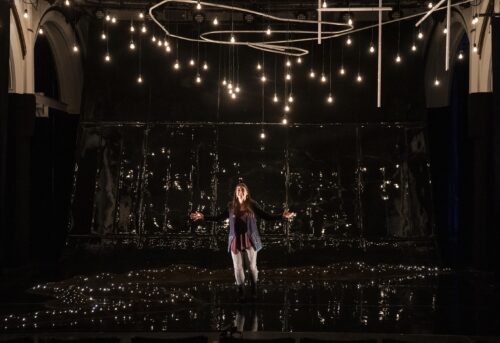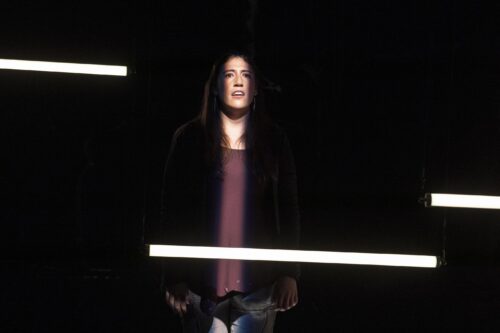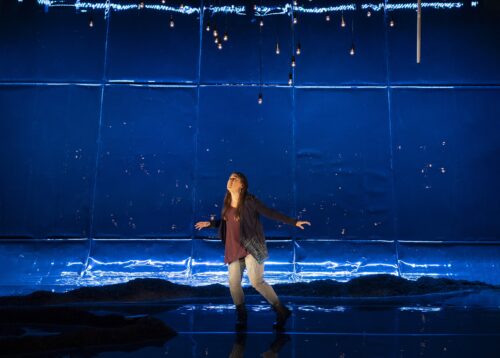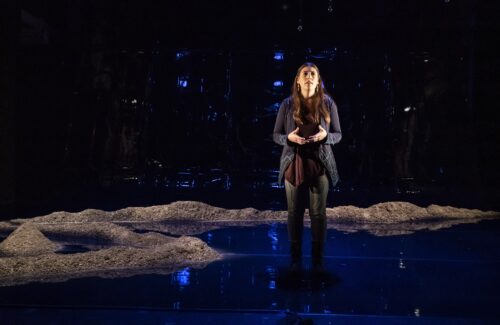MADELINE SAYET LIFTS US UP WHERE SHE BELONGS
Near the start of her solo show Where We Belong, currently playing at The Public Theater, playwright-performer-academic Madeline Sayet evocatively states, “Today’s story: is how I became a bird”. This Mohegan Indian performer says this after the first chapter of her story, which describes her experiences at various European borders she crosses on her way to London where she will begin a PhD program in Shakespeare. And the theme of overcoming boundaries — be they environmental, racial, literary, academic, mental, physical or any other configuration where one might feel unaccepted — runs throughout this informative though not always emotionally compelling performance. Sayet’s point seems to be that through the work of challenging these obstacles and the wisdom and insights gained therein, she transformed from the land-based, more physically held, wolf ideology that is an intrinsic part of Mohegan identity to the freer, more spontaneous blackbird that she was named after at birth — “blackbird” being the literal meaning of her Mohegan name, Sgayo Jeets.
Hao Bai’s set is a high angle POV looking down from the heavens onto the ocean that surrounds an undeveloped land mass, perhaps Manhattan, centuries ago. Sayet spends the show in the space between the land and the stars, occasionally landing on earth then heading back up. For instance, Sayet offers familiar family scenes between her and her loving, strong-willed, Mohegan activist mother in Connecticut but also flies back to the clouds as more lyrical, unfettered language describes Sayet’s inner feelings and thoughts. Overall, the show is structured like chapters in a book, following a basic linear storyline about her journey toward PhD completion in London. However, within the chapters, Sayet does not limit herself to only building upon that narrative but takes the audience on various trajectories both directly and indirectly related.
Because the writing and Sayet’s scope of interest operate on multiple levels, these tangents facilitate the deeper exploration that Sayet is really doing. For within her performance, she examines the theft of language, colonialism within Shakespeare, racial identity, the complexity of Native culture, museum entitlement, the mother-daughter relationship, connection to the land, atrocities against the Mohegan people, the transition from idealism to hard reality, the sometimes burden of achieving for “the race”, inadvertent white-passing (her father is Jewish), the rewriting of history and British obliviousness to the effects of their imperial past. And probably a few more.
This wide swath of engagement is both the strength and weakness of this interesting piece that at times can play like a dissertation, a lecture, a fully felt performance or a lyrical choreo-poem. Perhaps a bit more editing and focusing could deliver a tighter, more impactful show — unless Sayet is writing from a cultural perspective that is different from the horizontal, narrative view that informs so much of Western theater. Might that be the point her bird is making, to expose audiences to a Mohegan infused way of storytelling?
As a performer, Sayet is appealing and often humorous. Her deep intelligence informs all aspects of the production and she often comes off like that great professor that everyone finds to be so cool. Her land acknowledgement at the beginning of the show was warm, historicized, specific and personal. It demonstrated how this ritual, sometimes perfunctorily done at the top of many shows, can be very affecting when done from the right place.
Where We Belong is an interesting mix of storytelling techniques that reflect the jumble of ideas, thoughts and identities swirling within writer/performer Madeline Sayet. If you like your academia mixed with a healthy splash of theatricality, coming from a unique and important voice that deserves wider amplification, Ms. Sayet’s journey to earning a PhD in Shakespeare may be the ride for you.
photos of Madeline Sayet by Joan Marcus
Where We Belong
The Public Theater, 425 Lafayette Street
produced with Woolly Mammoth Theatre Company
in Association with Folger Shakespeare Library
ends on November 27, 2022
Tues-Sat at 8; Sat & Sun at 2
for tickets, call 212.967.7555 or visit The Public






